













Antique Handcrafted One Hundred and Ten Carats Genuine Natural Smoky Quartz Crystal Faceted Emerald Cut from Mount Cairngorm, Scotland.
CLASSIFICATION: Smoky Quartz Faceted Emerald.
ORIGIN: Mount Cairngorm, Scotland. 19th Century. Handcut in or near Yekaterinburg, Russia, 19th Century.
SIZE: Length: 33mm. Width: 26mm. Depth: 22mm. All measurements approximate.
WEIGHT: 110.36 carats.
NOTE: Upon request we can set your gemstones as a ring, pendant, or as earrings.
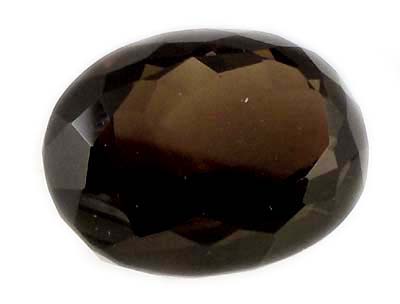
DETAIL: Smoky quartz from Mount Cairngorm, Scotland, known as "cairngorm", and since ancient times has been a favorite ornamental gemstone. Smoky quartz was very popular with the ancient Romans, who often used the stone for carving intaglio seals. Cairngorm is also the national gemstone of Scotland and has been considered a sacred stone for millennia, a belief dating back to the Druids. For centuries Smoky Quartz has also been commonly set into the pommel of the Scottish dirk, or “black dagger”, a long dagger with a straight blade that is a prerequisite of Highland costume. Here’s one such gemstone, a very uncommon semi-precious gemstone from Victorian-era Scotland, specifically Mount Cairngorm. Very popular in 18th and 19th century Victorian Scotland, this gemstone is known either as “Smoky” or “Cairngorm” Quartz. Generally “crystal” clear, the smoky tone is caused by the natural radiation emanating from granite stone the quartz is exposed to while buried in the earth.
This is a very handsome, very large emerald cut smoky quartz crystal gemstone. This particular specimen is completely transparent, with beautiful sparkle and luster. It is exceptionally clean, water clear, and very bright. It is gorgeous smoky brown color. The gemstone was hand crafted and faceted by a 19th century Russian artisan, part of an heritage renown for the production of the elaborate gemstones and jewelry of the Czars of Medieval, Renaissance, and Victorian Russia.
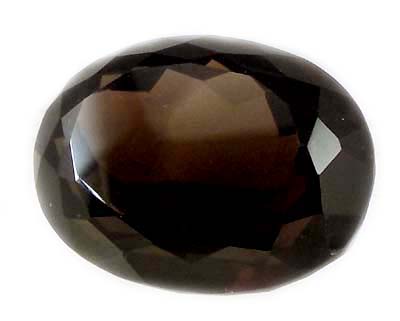
Under magnification the gemstone shows the unmistakable characteristics of having been hand crafted. The coarseness of the 19th century finish is considered appealing to most gemstone collectors, and is not considered a detriment, or detract from the value of a gemstone. These characteristics are not only expected of hand-finished gemstones, most serious collectors consider such gemstones more desirable, possessed of greater character and uniqueness when compared to today's cookie-cutter mass-produced machine-faceted gemstones. Unlike today’s computer controlled machine produced gemstones that approach flawlessness in a perfect finish, the cut and finish of a handcrafted gemstone such as this is the legacy of an artisan who lived two centuries ago.
This gemstone possesses superb luster and sparkle, and to the eye is completely transparent, but one cannot say with absolute certainty that it is unconditionally flawless. True, the blemishes it possesses are not visible to the naked eye, and the gemstone can be characterized, to use trade jargon, as "eye clean", it even approaches “loupe clean”. To the eye it is indeed flawless; however were one to examine it in a 10x jeweler’s loupe, it’s almost certain that a few minute blemishes could be detected. Of course the same may said about almost any natural gemstone. An absolutely flawless gemstone simply is not the rule in nature. Most absolutely flawless gemstones will upon close examination be revealed to be synthetic. You might also notice under magnification occasional irregularities in the cut and finish.
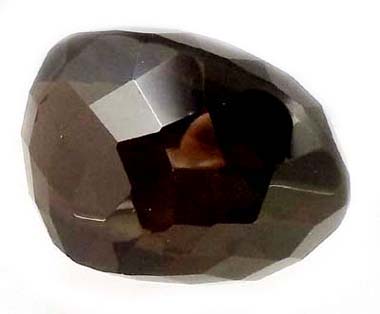
Naturally these characteristics are not only expected of hand-finished gemstones, you must also consider that two centuries ago the mining techniques prevalent did not allow the ultra deep mining operations which are so common today. Keep in mind that two centuries ago mankind was more or less limited to surface deposits or near surface deposits of gemstones. Higher quality gemstones which today are routinely mined from beneath hundreds of meters, even kilometers beneath the earth's surface, were simply inaccessible then. For these reasons antique gemstones must be appreciated as antiques first, gemstones second. The relatively superlative quality of contemporary gemstones routinely mined from deep beneath the earth's surface today were simply not accessible two centuries ago, or at least, only rarely so. However for most, the unique nature and character of antique gemstones such as this more than makes up for minute blemishes which by and large, are (if at all) only visible under high magnification.
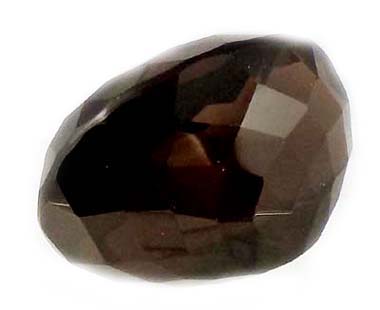
HISTORY OF SMOKY QUARTZ: Smoky quartz from Mount Cairngorm, Scotland, known as "cairngorm", has since ancient times has been a favorite ornamental gemstone. It is national gemstone of Scotland and has been considered a sacred stone there for millennia, a belief dating back to the Druids. The Celtic population of the British called smoky quartz they mined in the Cairngorm Mountains of the Scottish highlands “morion”, and the yellow-brown to gray-brown crystals mined there “cairngorm” Beginning in the seventeenth century, craftsmen of Scottish weapons began to incorporate smoky quartz or citrines from the Cairngorm Mountains into shoulder brooches, kilt pins and dirk pommels. Smoky quartz was and is a favorite ornamental stone set into the pommel of the Scottish dirk, or “black dagger”, a long dagger with a straight blade that is a prerequisite of Highland costume, having first appeared in the eighteenth century as a military accoutrement.
A man’s “sgian dubh” (literally “black dagger” but also known as a “sock knife”) was invariably carried in a place of concealment, very often under his armpit. However when calling on another household Highland protocol called for men to deposit their weapons (claymore or broadsword, dirk, pistols, etc.) at the front door. Nonetheless even when visiting friends it was not safe to be entirely unarmed, and so Highlanders kept their dirk close at hand. But out of courtesy to his host the proper Highland gentleman would remove it from under his armpit and put it somewhere where his host could see it, usually in his stocking, which incidentally also made it even quicker to access if needed. Even the Scottish royal scepter features a cairngorm stone. It is made of silver gilt and topped by a 2½ inch sphere of Scottish smoky quartz and a Scottish pearl. It was a gift in 1494 A.D. from Pope Alexander VI to King James IV, as a symbol of papal support for Scotland, a “special daughter” of the Holy See. Together with a royal crown and sword, the three items form the Scottish “honors”, first used together at the coronation Mary, Queen of Scots at Stirling Castle in 1543. They were last used at the coronation of King Charles II at Scone Palace, the ancient crowning place of the kings of Scotland, on January 1, 1651, the last coronation to ever take place in Scotland.
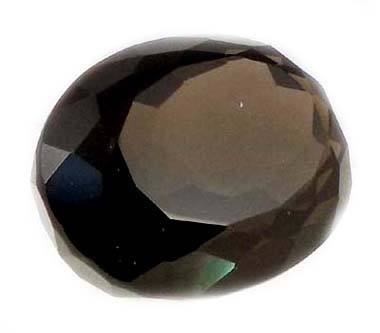
Other ancient cultures have used smoky quartz, and the Cairngorm Mountains were not the only source of smoky quartz in the ancient world. Much of the smoky quartz in the classical Mediterranean World came from the Swiss Alps. Fragments of smoky quartz vases have been uncovered in the excavations of ancient Babylonian Ur. Smoky quartz was popular in ancient times with the Romans, who used the stone for carving intaglio seals. In the Middle Ages the most important deposit of smoky quartz was in Upper Silesia (now Poland). According to legend, a crystal ball of smoky quartz was the scrying or diving tool used by the renowned Dr. John Dee (1527-1608), alchemist, mathematician, astrologer, magician, and court diviner to Queen Elizabeth I of England (1533-1603). In Medieval Europe smoky quartz gemstones were often engraved with the image of a man in armor holding a bow and arrow. The stone supposedly guarded the wearer and the place where it was situated. According to some historical references, smoky quartz was made into “sunglasses” in 12th century Medieval China, so that judges could use the smoky quartz glasses to hide their facial expressions when they interrogated witnesses. Later smoky quartz gained popularity as a material from whence snuff bottles were carved.

Historically smoky quartz was often used shamanistic rituals, particularly in North American Indian ceremonies where smoky quartz was often found at the top of ritual wands used by some Indian cultures. It was particularly prized by the Cherokees. In fact throughout the history of the ancient world gemstones were believed capable of curing illness, possessed of valuable metaphysical properties, and to provide protection. Found in Egypt dated 1500 B. C., the "Papyrus Ebers" offered one of most complete therapeutic manuscripts containing prescriptions using gemstones and minerals. Gemstones were not only valued for their medicinal and protective properties, but also for educational and spiritual enhancement. In the ancient world smoky quartz was recognized as a gemstone which possessed healing properties, and was also used by shamans to bring rain. Smoky quartz when worn as a talisman was also believed to protect the wearer from negative forces, surrounding the wearer with a barrier of protective energy. In the ancient world smoky quartz was often associated with the Greco-Roman Goddess Hecate, the goddess of magic, witchcraft, and necromancy (the summoning of the spirit of a deceased person).
Modern practitioners sometimes refer to smoky quartz as "the dream stone," as it is thought to enhance dreams, meditation, and channeling abilities. Smoky quartz is regarded as calming, soothing, comforting and stabilizing, with the power to restore balance and harmony, transform negative emotions to more positive energies, and to improve clarity of thought. Modern practitioners use smoky quartz to treat stress, depression, nightmares, fear, panic, depression, and pessimism. It is believed to help dispose of “psychic waste”, and to foster the courage to make changes and break bad habits, especially old beliefs and emotions that prevent one from experiencing life fully. On the physical side, smoky quartz is regarded as a powerful healer, used to help remove toxins from the body and aid the proper functioning of the kidneys (relieving fluid retention), adrenals, and pancreas. It is also used to help balance sexual energies, as well as help increase fertility. Worn as an amulet, smoky quartz is said to keep the mind clear, banish confusion, clear ambivalence, fortify resolve, help the wearer consciously focus on spiritual growth, and heighten the wearer’s understanding of nature and the environment. Contemporary spiritualists claim that smoky quartz Smokey Quartz is a very powerful scrying stone, revealing visions of dragons, strange astral realms and ancient secrets.
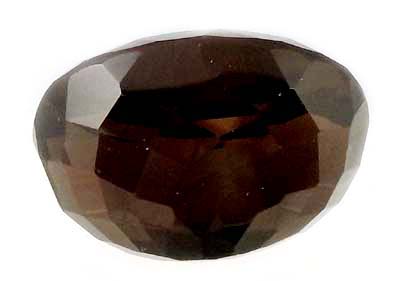
SHIPPING & RETURNS/REFUNDS: Your purchase will ordinarily be shipped within 48 hours of payment. We package as well as anyone in the business, with lots of protective padding and containers. All of our shipments are fully insured against loss, and our shipping rates include the cost of this coverage (through stamps.com, Shipsaver.com, the USPS, UPS, or Fed-Ex). International tracking is provided free by the USPS for certain countries, other countries are at additional cost. ADDITIONAL PURCHASES do receive a VERY LARGE discount, typically about $5 per item so as to reward you for the economies of combined shipping/insurance costs.
We do offer U.S. Postal Service Priority Mail, Registered Mail, and Express Mail for both international and domestic shipments, as well United Parcel Service (UPS) and Federal Express (Fed-Ex). Please ask for a rate quotation. We will accept whatever payment method you are most comfortable with. Please note for international purchasers we will do everything we can to minimize your liability for VAT and/or duties. But we cannot assume any responsibility or liability for whatever taxes or duties may be levied on your purchase by the country of your residence. If you don’t like the tax and duty schemes your government imposes, please complain to them. We have no ability to influence or moderate your country’s tax/duty schemes.
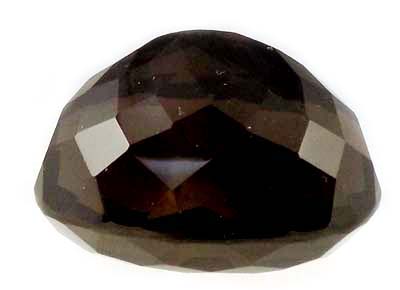
If upon receipt of the item you are disappointed for any reason whatever, I offer a no questions asked 30-day return policy. Send it back, I will give you a complete refund of the purchase price; 1) less our original shipping/insurance costs, 2) less non-refundable eBay payment processing fees. Please note that eBay does NOT refund payment processing fees. Even if you “accidentally” purchase something and then cancel the purchase before it is shipped, eBay will not refund their processing fees. So all refunds for any reason, without exception, do not include eBay payment processing fees (typically between 5% and 15%) and shipping/insurance costs (if any). If you’re unhappy with eBay’s “no fee refund” policy, and we are EXTREMELY unhappy, please voice your displeasure by contacting eBay. We have no ability to influence, modify or waive eBay policies.
ABOUT US: Prior to our retirement we used to travel to Europe and Central Asia several times a year. Most of the items we offer came from acquisitions we made in Eastern Europe, India, and from the Levant (Eastern Mediterranean/Near East) during these years from various institutions and dealers. Much of what we generate on Etsy, Amazon and Ebay goes to support The Hermitage Museum in St. Petersburg, as well as some other worthy institutions in Europe and Asia connected with Anthropology and Archaeology. Though we have a collection of ancient coins numbering in the tens of thousands, our primary interests are ancient jewelry and gemstones. Prior to our retirement we traveled to Russia every year seeking antique gemstones and jewelry from one of the globe’s most prolific gemstone producing and cutting centers, the area between Chelyabinsk and Yekaterinburg, Russia. From all corners of Siberia, as well as from India, Ceylon, Burma and Siam, gemstones have for centuries gone to Yekaterinburg where they have been cut and incorporated into the fabulous jewelry for which the Czars and the royal families of Europe were famous for.
My wife grew up and received a university education in the Southern Urals of Russia, just a few hours away from the mountains of Siberia, where alexandrite, diamond, emerald, sapphire, chrysoberyl, topaz, demantoid garnet, and many other rare and precious gemstones are produced. Though perhaps difficult to find in the USA, antique gemstones are commonly unmounted from old, broken settings – the gold reused – the gemstones recut and reset. Before these gorgeous antique gemstones are recut, we try to acquire the best of them in their original, antique, hand-finished state – most of them centuries old. We believe that the work created by these long-gone master artisans is worth protecting and preserving rather than destroying this heritage of antique gemstones by recutting the original work out of existence. That by preserving their work, in a sense, we are preserving their lives and the legacy they left for modern times. Far better to appreciate their craft than to destroy it with modern cutting.

Not everyone agrees – fully 95% or more of the antique gemstones which come into these marketplaces are recut, and the heritage of the past lost. But if you agree with us that the past is worth protecting, and that past lives and the produce of those lives still matters today, consider buying an antique, hand cut, natural gemstone rather than one of the mass-produced machine cut (often synthetic or “lab produced”) gemstones which dominate the market today. We can set most any antique gemstone you purchase from us in your choice of styles and metals ranging from rings to pendants to earrings and bracelets; in sterling silver, 14kt solid gold, and 14kt gold fill. When you purchase from us, you can count on quick shipping and careful, secure packaging. We would be happy to provide you with a certificate/guarantee of authenticity for any item you purchase from us. There is a $3 fee for mailing under separate cover. I will always respond to every inquiry whether via email or eBay message, so please feel free to write.

